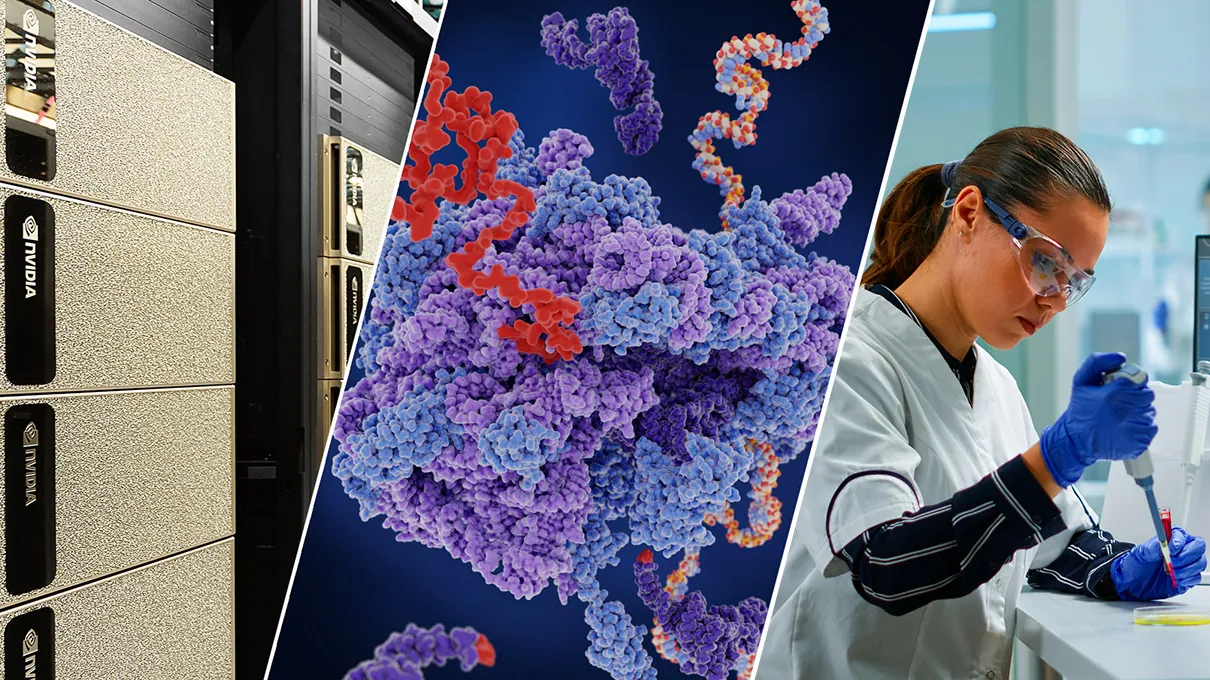Introduction
NVIDIA unveiled a suite of generative AI microservices at this year’s GTC. These microservices are designed to propel the drug discovery process into a new era by harnessing the power of generative AI.
This innovative approach transforms how healthcare enterprises, ranging from pharmaceutical giants to biotech startups, can predict, simulate, and create digital biology solutions.
- Generative AI Microservices: These are essentially building blocks that developers can use to create custom applications for drug discovery. They are designed to be easy to use and work on existing NVIDIA hardware.
- Focus on Speed: NVIDIA claims that these microservices can significantly reduce the time it takes to develop and deploy AI-powered drug discovery tools.
- Benefits Beyond Drug Discovery: The microservices can also be used for medical imaging, speech recognition, and other healthcare applications.
Follow us on Linkedin for everything around Semiconductors & AI
Generative AI’s Role in Drug Discovery

Generative AI is revolutionizing the drug discovery process, offering a powerful tool to overcome the traditional challenges of high costs and lengthy timelines. Here’s why generative AI is not just beneficial but necessary in drug discovery:
Accelerating the Discovery Pipeline : Generative AI can rapidly generate millions of potential drug compounds and evaluate them. In result, efficiently narrowing down the candidates for further testing.
Enhancing the Quality of Drug Candidates : Generative AI can predict the properties of new compounds and their interactions with biological targets by analyzing vast amounts of biological data.
Expanding the Horizon of Possibilities: Generative AI has the capability to create entirely new molecular structures that human researchers might not conceive.
Optimizing Drug Design: Machine learning algorithms such as Generative Adversarial Networks (GANs) and recurrent neural networks (RNNs) play a crucial role in generative AI. They help optimize drug designs, making de novo drug design more efficient. Additionally, they enhance the likelihood of discovering effective drugs.
A “de novo drug” is a completely new compound designed from scratch to treat a specific disease, without being based on existing drugs or modifications.
Read More:Did Micron Just Shock Analysts with a $204 Million Operating Income Beat? – techovedas
The Dawn of a New Era in Healthcare
NVIDIA’s launch marks a pivotal moment in computational biology. With over two dozen new microservices, NVIDIA is offering healthcare enterprises the tools to leverage generative AI’s. These services are not just add-ons but foundational elements that enable the creation and deployment of cloud-native applications across the globe.
Read More: Top 10 Cloud Service Providers of World in 2024 – techovedas
A Closer Look at NVIDIA’s Healthcare Microservices
At the heart of these services lies NVIDIA NIM™. NIM is short form for Nvidia Inference Microservices. It is a collection of AI models that provide optimized inference* for a wide array of applications, including imaging, medtech, and drug discovery. These models serve as the building blocks for generative biology and chemistry, offering unprecedented speed and accuracy in molecular prediction.
AI inference refers to the process of using a trained model to make predictions
Optimized Inference Across Healthcare Applications NVIDIA NIM™ is a suite of AI models that deliver optimized inference capabilities. This means they are designed to process data and provide insights rapidly and accurately. These models are applicable across various healthcare domains, including imaging, medical technology (medtech), and drug discovery.
Building Blocks for Generative Biology and Chemistry – The AI models within NVIDIA NIM™ serve as fundamental components for generative biology and chemistry applications. They enable researchers and healthcare professionals to simulate and predict molecular structures and behaviors with remarkable speed and precision.
Molecular Prediction with Unprecedented Speed and Accuracy : NVIDIA NIM™ has a standout feature: its ability to perform molecular predictions. These predictions are fast and accurate. This feature is especially crucial in drug discovery. Understanding how molecules interact with biological targets can speed up the development of new medications significantly.
Supporting Cloud-Native Applications Globally : NVIDIA NIM™ microservices are designed to be cloud-native. This means that they are built to run efficiently in cloud computing environments. Thus, you can access resource intensive algorithms without overloading your computer.
A Previous Success Story
Cadence, a leading computational software company, is integrating NVIDIA BioNeMo™ microservices for AI-guided molecular discovery and lead optimization into its Orion® molecular design platform, which is used for accelerating drug discovery.
Orion allows researchers at pharmaceutical companies to generate, search and model data libraries with hundreds of billions of compounds. BioNeMo microservices, such as the MolMIM generative chemistry model and the AlphaFold-2 model for protein folding, substantially enhance Orion’s design capabilities.
“Our pharmaceutical and biotechnology customers require access to accelerated resources for molecular simulation,” said Anthony Nicholls, corporate vice president at Cadence. “By leveraging BioNeMo microservices, researchers can generate molecules that are optimized according to scientists’ specific needs.”
How to access
Developers can experiment with NVIDIA AI microservices at ai.nvidia.com and deploy production-grade NIM microservices through NVIDIA AI Enterprise 5.0 running on NVIDIA-Certified Systems™ from providers including Dell Technologies, Hewlett Packard Enterprise, Lenovo and Supermicro, leading public cloud platforms including Amazon Web Services (AWS), Google Cloud, Microsoft Azure and Oracle Cloud Infrastructure, and on NVIDIA DGX™ Cloud.
Conclusion
NVIDIA has ventured into generative AI microservices for drug discovery. This move is not just a technological advancement; it’s a beacon of hope for the future of healthcare. By democratizing access to cutting-edge AI tools, NVIDIA is advancing medicine. Additionally, it’s empowering those at the forefront of healthcare to make monumental strides in the fight against disease.




